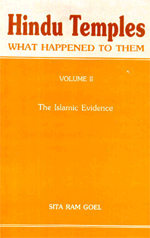|
 Page 1
Page 1
Muslim theologians and historians present a pretty dark picture of pre-Islamic Arabia. Its people, we are told, were unrepentant pagans and polytheists unware of the Unity of God and the succession of his Prophets. They believed that Allăh, the one and only True God, stood in need of partners who could mediate between him and his creatures. Worse still, they gave daughters to Allăh while they preferred sons for themselves. They worshipped stones (authăn) and statues (aSnăm) and offered sacrifices to satans. They had had no Prophet (Rasűl) and possessed no scripture (Kităb) of their own. Consequently, they were ignorant of the Last Day (Qiyămat), as also of Heaven (Jannat) and Hell (Jahannam). They revelled in blood feuds, and buried alive their female infants. Sons married their step-mothers, and the same man two or more uterine sisters. And so on, till the conviction grows on the readers or listeners that the pre-Islamic Arabs were despicable barbarians.
Christian theologians and historians follow suit. They do not endorse Muhammad as a prophet; in fact, they call him an impostor. All the same, they prefer him to the pagans and polytheists whom he fought and subdued. They do not concede that Muhammad"s message was spiritually sound or morally adequate. Yet they hail his teachings as a marked improvement on the mode of worship and morals which prevailed earlier. Thus they stand solidly, though negatively, united with their Muslim counterparts in denouncing the state of affairs in pre-Islamic Arabia.
And there is no dearth of Hindu scholars, even Hindu saints, who join the chorus. Even those Hindus who are by no means enamoured of Islam and distrust or despise it as a religion, regard it none-the-less an immense improvement over what went in Arabia before its advent. They say that Islam united the "Arab rabble" into a "nation", and gave them at least the "rudiments of culture". It never occurs to these Hindus that Muslim scholars who denounce pre-Islamic Arabia view pre-Islamic India also as an "area of darkness" to which Islam brought "illumination" for the first time. Though Hindus have been victims of Islamic aggression for several centuries, few of them feel sympathy for victims of the same aggression elsewhere.
The pre-Islamic Arabs seem to have no case simply because no one and almost nothing has survived to tell their side of the story. Unlike the Hindus who have survived the onslaught of Islam and can compare what they had with what was brought in by Islam, the pre-Islamic Arabs have passed into what is more or less a total oblivion. The Prophet of Islam and his rightly-guided Caliphs saw to it that no trace was left of the pre-Islamic religion and culture of Arabia, not even in the consciousness of the converts. Franz Babinger writes vis-a-vis the pre-Islamic Sabaean civilization of Arabia: "The new creed had the greatest interest in obliterating all recollection of the pagan period, not only in stone monuments which still survived the natural weathering--these were destroyed to provide material for new buildings, or burned for lime or sometimes out of sheer vandalism--but also in literature, and even in consigning the ancient language to oblivion."1 Whatever could not be wiped out was converted so completely as to look like a contribution of Islam. The Ka"ba and the Hajj ceremonies provide excellent examples. So does the Arabic language which, although it retains its old sounds and syntax, has been made to convey meanings and concepts which were foreign to it in its pristine state.
Author : Shri Sita Ram Goel
Footnotes:
1. First Encyclopaedia of Islam 1913-1936, Leiden, 1987, Vol. VII, P. 15.
|